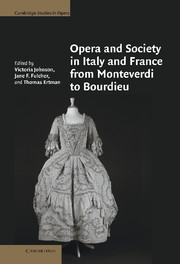Book contents
- Frontmatter
- Contents
- List of illustrations
- List of tables
- List of musical examples
- Notes on contributors
- Foreword
- Acknowledgments
- Introduction: Opera and the academic turns
- I The Representation of Social and Political Relations in Operatic Works
- II The Institutional Bases for the Production and Reception of Opera
- III Theorizing Opera and the Social
- Introduction to Part III
- 11 On opera and society (assuming a relationship)
- 12 Symbolic domination and contestation in French music: Shifting the paradigm from Adorno to Bourdieu
- 13 Rewriting history from the losers' point of view: French Grand Opera and modernity
- 14 Conclusion: Towards a new understanding of the history of opera?
- Bibliography
- Index
Introduction to Part III
Published online by Cambridge University Press: 22 September 2009
- Frontmatter
- Contents
- List of illustrations
- List of tables
- List of musical examples
- Notes on contributors
- Foreword
- Acknowledgments
- Introduction: Opera and the academic turns
- I The Representation of Social and Political Relations in Operatic Works
- II The Institutional Bases for the Production and Reception of Opera
- III Theorizing Opera and the Social
- Introduction to Part III
- 11 On opera and society (assuming a relationship)
- 12 Symbolic domination and contestation in French music: Shifting the paradigm from Adorno to Bourdieu
- 13 Rewriting history from the losers' point of view: French Grand Opera and modernity
- 14 Conclusion: Towards a new understanding of the history of opera?
- Bibliography
- Index
Summary
In examining specific historical instances of operatic production and consumption, each of the ten essays comprising Part I and Part II of this volume has taken a stand, sometimes explicitly, but more often implicitly, on the matter of how opera scholars can most fruitfully theorize, grasp, and analyze opera's relation to what is conventionally termed “society.” In the third and final section of this volume, three authors based in three different academic disciplines reflect on how opera scholars might push further still in their efforts to understand the changing social constellations from which opera emerges and on which it exercises its own transformative power.
In the first of these three chapters, entitled “On opera and society (assuming a relationship),” the comparative literature scholar Herbert Lindenberger considers “what happens … when we allow the terms ‘opera’ and ‘society’ to jostle against one another.” The “social” appears, he notes, at every turn: for example, in the political, economic, and cultural conditions under which an opera is commissioned and/or composed; in the literary and musical style of its libretto and its music; in the context in which it is first heard and seen; and in the influence of its reception history on its subsequent interpretation. Given the challenges posed to scholars by these and other social dimensions of opera, Lindenberger applauds the dramatic growth in and diversification of opera studies in all disciplines.
- Type
- Chapter
- Information
- Publisher: Cambridge University PressPrint publication year: 2007

